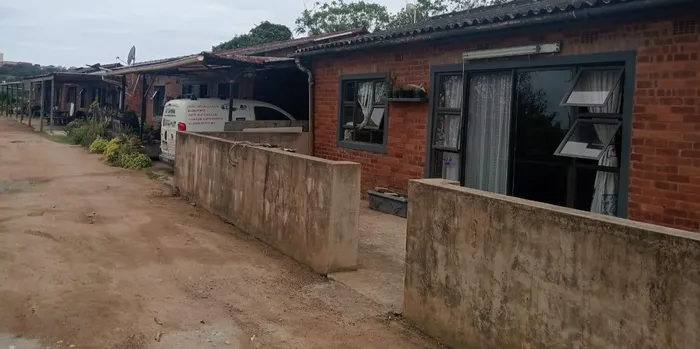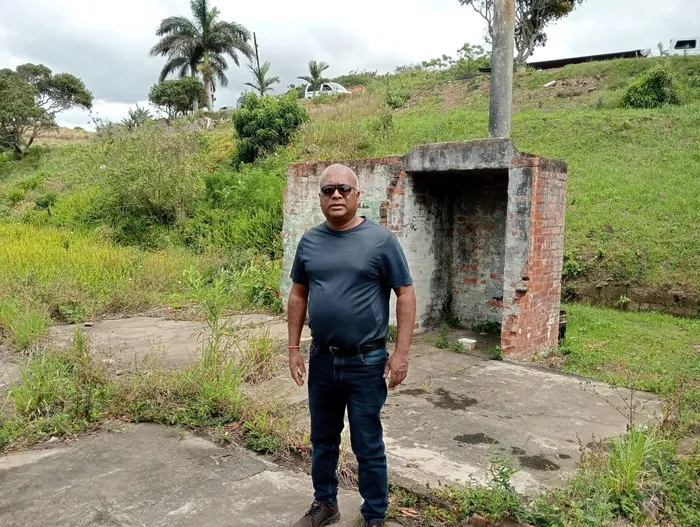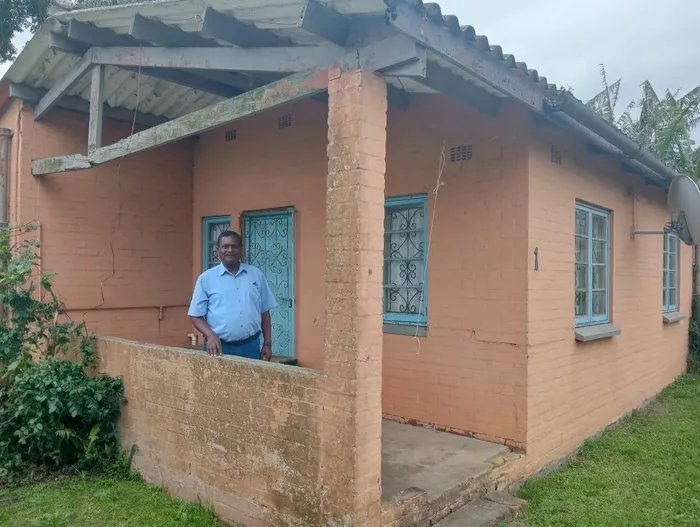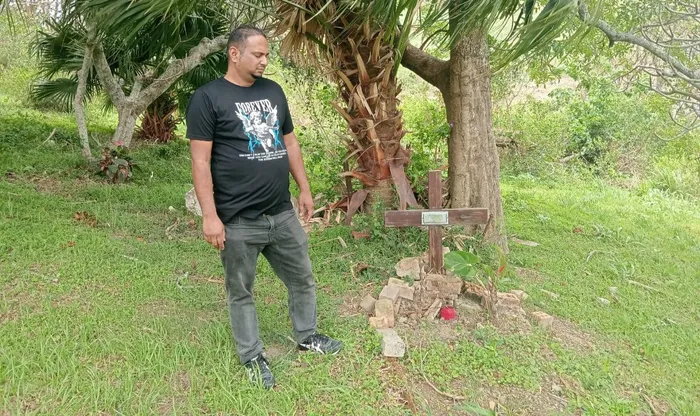Renishaw Farm families fear losing ancestral homes amid relocation plans
“THIS IS NOT JUST ABOUT HOUSES - IT’S ABOUT OUR HISTORY AND FUTURE”

Some of the homes on Renishaw Farm - also known as “Chinatown” - along KZN's South Coast.
Image: Nadia Khan
FOR OVER 30 families of indentured descent living on Renishaw Farm - also known as “Chinatown” - along KZN's South Coast, the promise of lifelong housing is being threatened by relocation plans.
Despite a deed of donation signed in 2019, residents now face potential displacement from homes their families have occupied for generations while working for Crookes Brothers Limited.
The families claimed they were misled about having their homes until their death.
They said many of their forefathers, who were indentured descendants, and themselves worked in various positions for Crookes Brothers Limited, which had a sugar cane plantation and mill on the farm, and had provided them with the homes where they lived with their families.
However, they were recently informed that there were plans for them to be moved to an area on the outskirts of Umzinto. The residents claimed there had been no consultation with the community.

Selvan Chetty, a human rights activist, who has been assisting the community, on the spot where one of the houses was demolished.
Image: Nadia Khan
Numerous threats
Selvan Chetty, a human rights activist, said for more than two decades he had been fighting for the community.
“The people of ‘Chinatown’ have faced numerous threats over the past two decades to disrupt their quiet, simple way of life. In 2005 I received information about the residents being forced to vacate the homes they had occupied for generations. Upon visiting the area, I saw that several homes which were once occupied by the residents were demolished. They were forced to leave.
“After speaking to the residents I also learned that the company had been gradually restricting their freedom and rights on the farm. Previously, each household used to be given coal and fuel for cooking; this was stopped and they were told to stop planting subsistence crops. I was also informed that the company also started to charge rent. They also had to get prepaid electricity and water,” he said.
Chetty, who is also the former Chief Whip of the Ray Nkonyeni Municipality, said he formed and led a committee with residents, and sought legal and political support to challenge the evictions.
“We engaged in several meetings with the company, which under the threat of legal action stopped the evictions and demolishing of houses. However, by then at least 10 houses had been demolished.
“By 2014 the committee formed a more structured engagement with the company. There were regular meetings held between the committee, the company and the Umdoni Municipality to secure the long term tenure of the residents,” he said.
Chetty said he approached the company with a view to acquire the houses by way of a donation.
“After much engagement the company granted a deed of donation in 2019. These houses were to be given to the beneficiaries through the Umdoni Municipality, which had to take the responsibility of transfer of the houses. However, the municipality failed to fulfill the conditional clauses in the agreement.
“We recently learned through the grapevine that the company was planning to donate a piece of land at the back end of Umzinto, far from the current lifestyle the residents enjoy, into an area considered to be unsuited for them.
“At a council meeting earlier this month, we were alerted that an item was to be tabled for the acceptance of the proposal of the new land donation. Prior to the meeting, we engaged with the municipality and requested them to remove the item from the agenda so as to allow for further discussion. We did indicate to the municipality that we reserve the right to challenge their decision legally should they go ahead,” he said.
Chetty said the committee believed that the company had failed to inform them of their plans in order to prevent them from taking legal action.
“However, we now know. We have seen the new proposal and we are not happy with it. We will fight this matter all the way to the highest court in the land if necessary.
“We believe that this site and its settlement needs to be protected from a historical perspective. But, most importantly, should our discussions fail, then we will call on the government to look at ‘expropriation without compensation,” he said.

Pastor Leslie Nagan outside the home in which 87-year-old sister resides.
Image: Nadia Khan
Historical ties
Pastor Leslie Nagan, a former resident and founding member of the committee, said his family had historical ties to the area.
He said his father had worked for the company for 54 years.
“My father started working in the sugar cane fields when he was just 11 years old. He later worked as a blacksmith until his retirement. I was born here and only moved away when I got married. But my family remained.
“We initially had a home, in what was known as the barracks, across the river. When the homes were damaged due to the floods in 1976, they built these shared cottages for all of the families and they were later moved to individual houses, where my 87 year old sister still lives,” he said.
Nagan said while his father worked for the company for many years, he only received a R108 pension payout at his retirement.
“He used to earn R36 a month; his pension was equivalent to three months of salary. However, at the time it was accepted as they were told that they could live in the house till they died. They also did not pay rent or for electricity and water at the time. They used to get free coal. But as soon as he retired, they started charging him rent and they later had to get prepaid electricity and water.
“A few years ago the community was being terrorised, when the company wanted them to move out. There was a lady that lived a few doors away from my sister that was forced to leave after she was threatened that they would mow her house down. She was so terrified that she left, and the house was demolished.
“We thought we finally had relief when the deed of donation was signed. The residents thought they could live peacefully again but now they have started again and this time it was done secretly. It seems they have no compassion for the people, whose forefathers helped to build the empire that they now have,” he said.

Sigamoney Reddy is concerned about his future.
Image: Nadia Khan
My father worked as an induna
Sigamoney Reddy, 80, said he worked for the company for 38 years.
“My father worked as an induna (supervisor) in the sugar cane fields, and when I joined I was the only long-distance truck-driver for the company. When I was about to retire they told me I would not have to pay for rent or any utilities for the next five years. This was because of the low salary I was paid. But as soon as I retired they started charging me.
“We were also so happy when they said the houses would officially be ours. During a community meeting after the deed of donation was signed, we were told that we would soon get our title deeds. But nothing has happened since then.
“Now they want to move us far away. I used whatever little money I received as my pension payout to renovate my house so I could live comfortably till my last days, and so that my children and their families would also always have a roof over their heads. When I think about being moved it makes me stressed, and I don’t know what to expect. It is not fair that at our age we have to worry about our future. We also worked very hard for the company, and accepted the low salary, because we were guaranteed to always have a home,” he said.
Invested money into homes
Selvi Takurparsad, 66, said she had been living in the area for more than 40 years.
Her late husband worked as a builder for the company.
“We used to live in the cottages and then were moved to the house when it became vacant. After my husband was placed on disability, we continued to live here. When he died I was told I can live here as long I want, even till I die. This was because of the low salary that he earned; the house was supposed to be a form of compensation.
“We have also invested money into our homes. The toilet and bath area was outside, so we built walls around it so that it was part of the house. We also did the replacing of the windows and doors, and other renovations because the company never did anything over the years. It is unfair that we must now give up our home and move to an unknown place. It is not fair,” she said.

Allister Naidoo at his grandfather’s gravesite on the farm. He fears the gravesite and religious buildings will be destroyed.
Image: Nadia Khan
Fate of religious buildings and gravesite
Allister Naidoo, 41, said he was concerned about the religious buildings and gravesite being destroyed.
“My entire family worked for the company and lived on the farm. My grandfather, Dorasamy Naidoo, drove a tractor to collect the sugar cane, and then later he worked at the crocodile farm (Crocworld). My father, Steven Naidoo, also worked for the company. When they died, as well as my grandmother, uncles and father-in-law, they were all buried here. What will happen if we are moved and there are new property developments; I doubt it will be built around their graves. Furthermore, we also have a church and a temple. It would be a sin to demolish these buildings.
“It is disheartening to learn that they want to take our homes away from us. This place holds our history and it is the only remaining remembrance of our loved ones, who worked so hard to put a roof over our heads. It was promised that it will always be ours, but now it is underhandedly being taken away,” he said.
The Umdoni Municipality and Crookes Brothers Limited did not respond by the time of publication.
In a statement, the Crookes Brothers Limited (CBL) said: "The donation was made in good faith as part of CBL’s ongoing commitment to community development within the Scottburgh area. However, the transfer and subdivision of the donated land have not been finalised due to the municipality’s inability to fulfil certain conditions outlined in the Deed of Donation - specifically, the installation of essential municipal services and infrastructure required for subdivision and registration.
"As a result, the Deed of Donation has lapsed. Nevertheless, CBL remains committed to honouring the spirit and intent of the donation and continues to engage constructively with Umdoni Municipality to find a sustainable resolution to the outstanding matters.
"CBL fully respects and adheres to the principles of the Extension of Security of Tenure Act (ESTA), which governs the rights of lawful occupiers residing on agricultural land. In line with this, the company recently attempted to conduct a census of occupiers at the property to ensure compliance with the Act. Unfortunately, this census was either not completed in full or not submitted by the occupiers as required.
"Additionally, CBL has become aware of several individuals currently residing on the property who do not appear to hold valid ESTA rights and have no historical employment or association with the company.
"CBL is not aware of any planned evictions, and no discussions or proceedings related to evictions have taken place. The company continues to advocate for dialogue and cooperative engagement to address any issues in a lawful, transparent, and humane manner.
"Crookes Brothers Limited remains committed to acting responsibly, respecting the rights of all affected parties, and working in partnership with Umdoni Municipality to realise the community benefits originally envisaged under the donation."
Crookes family pioneering begins in Renishaw
The history of Renishaw is interwoven with that of the pioneering Crookes family, their story dating back to 1860 when Samuel Crookes from Finningley in Yorkshire, England, arrived on the shores of Durban aboard the Rydal.
Samuel moved to Scottburgh and soon began farming sugar cane. He settled down, and proceeded to get married and have three sons and three daughters.
Renishaw Farm is the site of Samuel Crookes’ first cane farming and milling operation in the 1860s. He registered his company in 1878 as Samuel S Crookes & Sons for his farming and milling interests.
The family grew up, Samuel died at a rather young age of 67, and his sons consolidated the family farms and milling operation into Crookes Brothers Limited in 1913.
The Crookes family played a dominant role in the management of farming and milling operations, and the next generation followed suit and listed the company on the Johannesburg Stock Exchange in 1948.
- Sourced from the Crookes Brothers Limited website.
Related Topics: